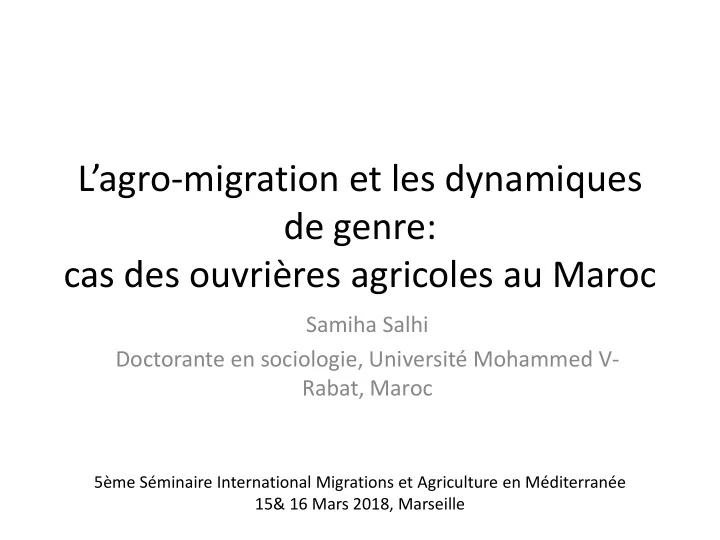

L’agro -migration et les dynamiques de genre: cas des ouvrières agricoles au Maroc Samiha Salhi Doctorante en sociologie, Université Mohammed V- Rabat, Maroc 5ème Séminaire International Migrations et Agriculture en Méditerranée 15& 16 Mars 2018, Marseille
Presentation plan This presentation aims to - Examine to what extent agricultural labor migration affects gender social relations - Understand if the incorporation of rural migrant women in Labor agro-migration has legitimized their emancipation or it has created new social bounds to their emancipation
Agro-migration context • The expansion of agro-migration is correlated to – The modernization of agriculture (Agrarian changes, commercial liberalization, globalized agriculture, agro-industrial system, etc.) – The changes in rural society (Changes on rural traditional values, the shift from subsistence economy to market economy, dismantling of the extended family, growing demographic pressure in the countryside, devaluing of family farming, the increasing pressure on cultivable land, etc.)
Agro-migration and gender dynamics • Agro-migration embodies a gendered dynamics • Determinants of migration do not differ for men and women • The presumed passivity in women migratory process is ignored • Women are not seen as appendage of men migration
Agro-migration and gender dynamics • Due to the differential economic opportunities that women and men face in agricultural work, women play an active role in migration
Decisions on labor agro-migration • Dismantling of family solidarity • The reorganization of family Economic engagement
Women’s socio-economic status • From unwaged family workers/housewives to waged seasonal agricultural labourers: • Agricultural labour migration provides to women a wage as it could be the main opportunity through which they could expect to become financially independent. • (In)Visibility of Women’s seasonal agricultural labour: • Women’s agricultural work is visible in their households and perceived as the indispensable income source for the family despite of its irregularity and its precarious working conditions.
(S)he is the breadwinner! • The woman’s role as the substantial provider of the family subsistence calls into question the long-standing notion that it is the man who is the major breadwinner of the family. • Women’s engagement in agricultural labour was seen to reflect the men’s incapacity to fulfil their roles as the breadwinners of the households. Where men have withdrawn from their roles as breadwinners, women had become the householders of their families, taking on new role of breadwinners without declaring themselves as such.
Changing gender relations • Low incomes prevent men from fulfilling their male roles as head of household and breadwinner. • Women’s roles and responsibilities have increased. • Men’s roles have become unclear and contradictory
Rural women have been integrated into a new form of agricultural labor in large numbers. Despite the evidence that women’s earnings are essential to household survival strategies, as it entails to empower women within their households, women’s engagement in agricultural labor migration leads to their pseudo-emancipation since the patriarchal system weakens the potential of their liberation by labor. Hence, gender social relations may at any time be reshaped and renegotiated.
Recommend
More recommend